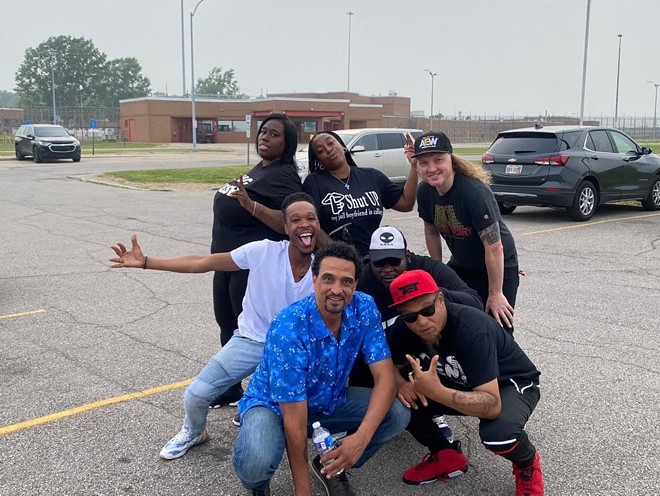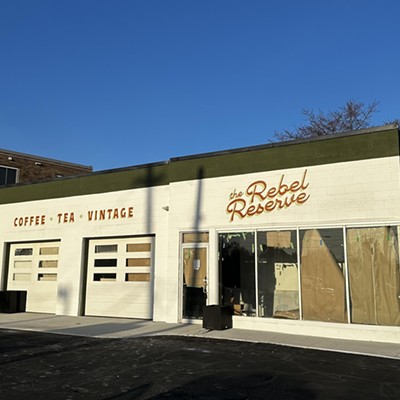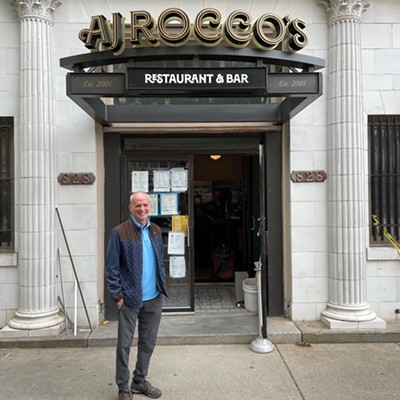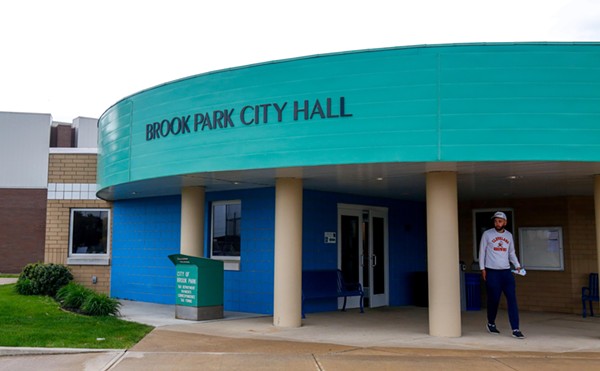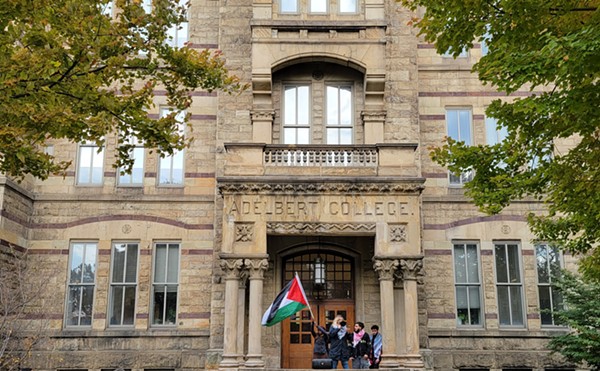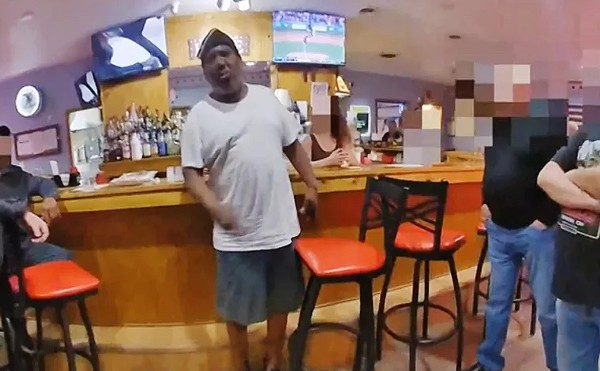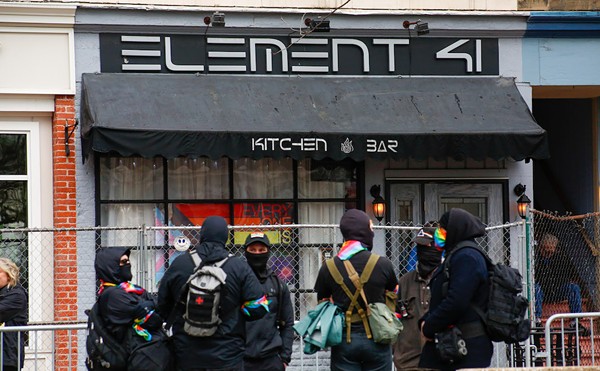At a Grafton Prison Comedy Show, Performers and Inmates Share Laughs, Hope and Human Connection
Stand-up in lockdown
By Tim Gill on Fri, Aug 11, 2023 at 7:11 am
[
{
"name": "Ad - NativeInline - Injected",
"component": "38482495",
"insertPoint": "3",
"requiredCountToDisplay": "5"
},{
"name": "Real 1 Player (r2) - Inline",
"component": "38482494",
"insertPoint": "2/3",
"requiredCountToDisplay": "9"
}
]
“I’m hosting a comedy show at Grafton correctional facility June 29th. I’m still in need of 2 extra comedians. If anybody would be interested just message me. Hope everyone has a great productive week.”
As a sociologist and comedian, Lakiesha Smith’s post in a local Facebook comedy group immediately caught my attention.
I quickly typed: “Wow! They allow that there?”
Smith responded: “yup. I’m an approved visitor. I go there a few times a year to provide resources and I got approved for a comedy show.”
Smith, who many know by the nickname Stoney, grew up in East Cleveland and Shaker Heights, spending much of her early 20s in and out of prison.
“I found out I was pregnant while in prison in 2008 and that changed my life,” she tells me. Now, she says, “I’m an activist, a community leader, a comedian, a mother, and someone that will continue to inspire those that have been impacted by the judicial system.”
Since her release from prison, Smith has started a non-profit named InmateToInspiration. “[It’s how] I give people the help they need getting out of prison that I didn’t have.” Through her connection to Ohio prisons, Lakeisha requested that Grafton Correctional Institute (GCI) allow her to host an early evening comedy show, and they approved it.
GCI is nestled in the countryside, 30 miles southwest of Cleveland, with many of its occupants coming from the Cleveland area. It opened in 1988 as a facility for incarcerated folks at the minimum- and medium-security level.
In recent years, it has hosted a unique range of programs for folks to connect with others beyond the prison walls, including a classical music program, a celebration of Clash Day with bands performing composed of incarcerated folks formed within GCI, a community garden to provide food for Catholic Charities, and a program to train service dogs.
I joined Smith and a group of five other comedians for the comedy show on June 29, not having any idea what to expect.
We performed on a stage in a gym to around 120 people, each of us receiving 15 minutes for stage time. Throughout the event, there was no barrier between the audience and us. Folks were coming up to our table in the front and conversing. Embraces and handshakes were exchanged. Comedians were interacting with the crowd members on every topic imaginable, including some who discussed their own time in prison.
Sidney Reed Jr., a 36-year-old comedian and drummer from the Kinsman neighborhood of Cleveland, joked, for example, about his top bunk in prison.
“I did 18 months. It was important to me, because I was in the same position they were in and I just wanted to give back because when you were in that position, it doesn’t feel good.”
Personally, I had never witnessed an audience appreciate standup comedy as much as the folks at Grafton did. Everyone was alert, focused, and truly enjoying the artform.
Indeed, that was the goal for many of the performers: to provide that sort of joy.
“I come from the housing projects and grew up rough: foster homes, institutions, juvenile jail, adult jail. You have family and friends locked up. It’s a part of life coming from my side of town,” Marquan Banks, a 32-year-old comedian from the E. 30th neighborhood of Cleveland, tells me.
“I hoped to provide relief, joy, and take their mind off their situation.”
Gene Miller, a 46-year-old comedian who grew up in public housing in Cleveland, expressed similar sentiments.
“I'm from the trenches, just like most of the inmates. I've done time myself and I have family and friends incarcerated. I hope that I could put a smile on their face and hopefully let them see that prison doesn't define them as a person and that they could come home and live a positive and productive life.”
For others, like Reneisha Minefee, a 42-year-old comedian from the Buckeye neighborhood of Cleveland, the event was very personal as her cousin was in attendance.
“It was my favorite cousin’s birthday, and I hadn’t seen him in 11 years, so I dedicated my 15 minutes to him.” Seeing the interaction between Reneisha and her cousin was touching, as she told several stories about him as a youth as the crowd cheered and roared.
For many comedians, they view comedy not as just getting a laugh, but as a therapeutic endeavor that helps them process their own traumas and connect with others.
“I love to joke about my real life, my experiences, my trauma. I use comedy as therapy. Like Kevin Hart said, it’s best to laugh at my pain,” Banks confesses.
Reed Jr. agrees. “I hope people understand that when I do comedy, it’s a getaway for me. It’s like therapy, and I also want people to understand that it’s also therapy for them too. Everybody needs laughter.”
As a sociologist, there’s nothing more human than getting together, telling stories, and laughing. Our humanity connects us and it was apparent how much everyone involved in the event appreciated the ability to share in our existence – our follies, our instincts, our small victories.
“The most memorable thing from the show was the love the inmates showed us,” Miller recounts. Similarly, Banks remembers how he “must have shook 50 hands that day. I really felt the love.”
During my own set, I asked if anyone grew up in the same Cleveland neighborhood as me: West Park. One young man raised his hand, and we connected after the show. He grew up just a few streets away from where I lived, and we discovered we knew some of the same people.
I had also worn an All Elite Wrestling (AEW) cap, and, after the show, several folks and I all talked about how much we appreciated professional wrestling in our lives. It might seem like a small thing, but it all connected us.
In the end, Smith tells me that she hopes to inspire incarcerated folks to move forward with their lives and live a fulfilling life, just as she has.
“I hope to encourage the people incarcerated to not give up. You can be whatever you want to be. Second chances are real. The work I do is from the heart. I want to show people that I’m more than a felon.”
Leaving Grafton that evening, I felt inspired, but also admittedly somber.
Nearly everyone I met grew up in the city of Cleveland, one of the poorest cities in the country. Many admitted to me that they made choices in their youth that they’re still dealing with, even decades later. Yet, many also spoke about the progress they’ve made – the classes they’ve taken and the skills they’re trying to acquire.
The American criminal justice system is devastating. Even after serving time and repaying debts, many folks remain stigmatized, often having to disclose their history to employers and other institutions. It should come as no surprise then that many folks return to prison after having opportunities forestalled.
Yet, the work that folks like Smith and others are doing to help formerly incarcerated folks reenter society heartened me, and I’m grateful to have had my own day brightened by the interactions and joy shared between us comedians and our audience that day.
Tim Gill (@timgill924) is an Associate Professor of Sociology, writer, and comedian.
Subscribe to Cleveland Scene newsletters.
Follow us: Apple News | Google News | NewsBreak | Reddit | Instagram | Facebook | Twitter | Or sign up for our RSS Feed
SCENE Supporters make it possible to tell the Cleveland stories you won’t find elsewhere.
Become a supporter today.
Scroll to read more Ohio News articles
Newsletters
Join Cleveland Scene Newsletters
Subscribe now to get the latest news delivered right to your inbox.

